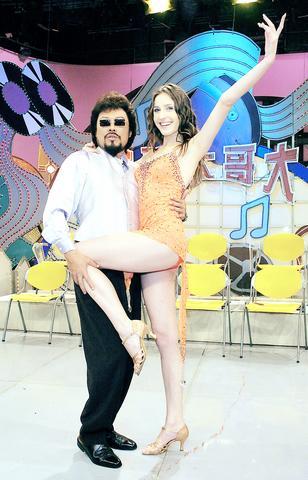Margarita Laurouskaya (
Well, a mermaid, actually. She came to Taiwan about four years ago from Belarus Athletic University along with a few classmates to join a team of synchronized swimmers that would perform nightly shows at a Taichung theme park that might be better described as a burlesque.

PHOTO: TAIPEI TIMES
Troupes of girls predominantly from former Soviet bloc states -- jin si mao (

PHOTO: TAIPEI TIMES
"My mother was working in a company where she could check all about the place where I was supposed to work and about Taiwan," she said in an interview this week. "She did a lot of checking and felt it was a legitimate show. So I came."
She and her classmates chose to abandon their university studies because the show would have them earning more in six months than they'd make in a year in Belarus. And so Margarita became a mermaid and had her picture blown up large on the show's poster.
"It was easy," she said of her experience in the show. "In Belarus we train to do this from when we're little and now we can do it here and make money. We don't have this kind of stuff in my country. We just do championship stuff. So everyone looks for work at water parks in Japan, France, America ? and Taiwan."
But after eight months in a scaly Spandex mermaid suit, Margarita was swum out. She returned to Belarus for about six months but decided her prospects were better back in Taiwan.
"I didn't want to jump from here ? to here," she said using her hands to indicate a precipitous drop.
But success in Taiwan meant having to learn the language. She'd met an agent, Kelly Chin (金玉珮), who said she could get her on television if she could speak Chinese. So Margarita holed-up in her apartment, leaving only to eat, attend Chinese class and for occasional modeling assignments. The rest of the time she spent watching television -- not for entertainment as much as education.
"I would really listen to what they were saying. This is how I learned Chinese," she said. "But you can't just learn the language, you have to learn the culture too."
Her break came a year later when Apple Daily (蘋果日報) ran a full-page pictorial on synchronized swimming that featured her. Taiwan's popular television host, Chang Fei (張菲), got one look at Margarita the mermaid and reeled her in.
She's been swimming, dancing and donning an endless array of bikinis on Chang's show every week since the beginning of this year -- earning a reported NT$200,000 a month for her troubles -- and was rumored to have danced her way into Chang's heart.
So is there anything going on between she and Chang?
"No."
Isn't he interested in her?
"I don't know," she said, then turned to ask her agent, Chin, who chaperoned her interview. "Is Chang Fei interested in me?"
"He's that way with all the girls," Chin says.
What about the guy Next magazine surreptitiously photographed her with? Margarita managed to look coy in a leopard-print bikini on the magazine's cover two weeks ago and an inside expose showed pictures of her with her "boyfriend" -- a guy far younger and less hirsute than Chang.
"That's my roommate," she explains. "Next magazine and Apple Daily followed me for two weeks trying to find something to write about. But there isn't anything. I'm too busy to have a boyfriend. I don't have time to go out."
Her schedule is taken up, she says, by taping Chang's show on Tuesdays, meeting to decide the content of the next week's show on Friday, and spending all weekend preparing for it. Rehearsals can be all-consuming. Weeks ago, she had to rent a gu zhen (
"The rest of the week, I have modeling shoots and press conferences," she said. "And I have a biography coming out later this month. It's all ready, except for the photos."
But for all the time she spends wearing bikinis in front of cameras, Margarita doesn't consider herself a professional model. Her job, she says, is simply to entertain people.
"I tried doing the serial television programs," she said, "but filming those shows isn't fun. I think you should have fun doing the show. The audience will see that and they'll have fun too."
It's a good philosophy, gauging by the reaction of people who watch her every week.
"Her ballet maybe isn't very professional, but it looks great on television!" said one avid watcher. "She's great because she comes across as nice and sweet and you can tell she really likes Taiwan."
Her goal, she says, is to host a television program of her own, but she doesn't rule out getting involved in film either.
"I just want to be a part in something that is quality," she said, emphasizing the word "part."
Asked if she's afraid that her fame is fleeting, Margarita reveals a side to her personality that likely helped gain her fame in the first place.
"Of course, all this won't last," she said smiling. "But I'm happy and feel very lucky for everything that has happened. I can always teach kids how to swim."

June 2 to June 8 Taiwan’s woodcutters believe that if they see even one speck of red in their cooked rice, no matter how small, an accident is going to happen. Peng Chin-tian (彭錦田) swears that this has proven to be true at every stop during his decades-long career in the logging industry. Along with mining, timber harvesting was once considered the most dangerous profession in Taiwan. Not only were mishaps common during all stages of processing, it was difficult to transport the injured to get medical treatment. Many died during the arduous journey. Peng recounts some of his accidents in

“Why does Taiwan identity decline?”a group of researchers lead by University of Nevada political scientist Austin Wang (王宏恩) asked in a recent paper. After all, it is not difficult to explain the rise in Taiwanese identity after the early 1990s. But no model predicted its decline during the 2016-2018 period, they say. After testing various alternative explanations, Wang et al argue that the fall-off in Taiwanese identity during that period is related to voter hedging based on the performance of the Democratic Progressive Party (DPP). Since the DPP is perceived as the guardian of Taiwan identity, when it performs well,

A short walk beneath the dense Amazon canopy, the forest abruptly opens up. Fallen logs are rotting, the trees grow sparser and the temperature rises in places sunlight hits the ground. This is what 24 years of severe drought looks like in the world’s largest rainforest. But this patch of degraded forest, about the size of a soccer field, is a scientific experiment. Launched in 2000 by Brazilian and British scientists, Esecaflor — short for “Forest Drought Study Project” in Portuguese — set out to simulate a future in which the changing climate could deplete the Amazon of rainfall. It is

The Taiwan People’s Party (TPP) on May 18 held a rally in Taichung to mark the anniversary of President William Lai’s (賴清德) inauguration on May 20. The title of the rally could be loosely translated to “May 18 recall fraudulent goods” (518退貨ㄌㄨㄚˋ!). Unlike in English, where the terms are the same, “recall” (退貨) in this context refers to product recalls due to damaged, defective or fraudulent merchandise, not the political recalls (罷免) currently dominating the headlines. I attended the rally to determine if the impression was correct that the TPP under party Chairman Huang Kuo-Chang (黃國昌) had little of a